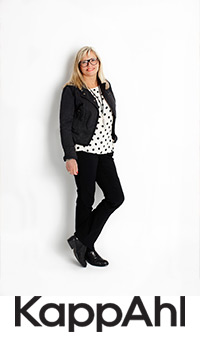"We see that knowledgeable suppliers with whom we have good and long-term relationships are often more willing to evolve and look to fair terms in their way forward. The more the knowledge, the faster the evolution."
Eva Kindgren, CSR Manager, Production, KappAhl
 KappAhl is a Swedish apparel retail store, and a recognized provider of fashionable apparel to consumers for the best possible value. Affordable fashion has always remained its motto. It was founded in 1953, and its role in encouraging sustainability in the global supply chain has remained commendable since then. A large chunk of its total apparel collection is eco-labeled.
KappAhl is a Swedish apparel retail store, and a recognized provider of fashionable apparel to consumers for the best possible value. Affordable fashion has always remained its motto. It was founded in 1953, and its role in encouraging sustainability in the global supply chain has remained commendable since then. A large chunk of its total apparel collection is eco-labeled.
How has the concept of sustainability and ethical business developed and changed over the years? Do you think that concept has changed the global corporate scenario?
Positive development is on-going; we see small progress almost every day. Areas where we see change is that the companies are becoming more transparent. Creative and result-oriented partnerships that accelerate development are increasing. The dialogue between other industry colleagues and social authorities, NGO’s, governments, trade unions are also increasing. There is absolute transparency in the way to work.
For a small company in a huge market, there are good opportunities to contribute and make a difference in co-operation projects like safety accord pact in Bangladesh and Sustainable Water Resources (SWAR) in India.
Do you think that organic cotton has not been received well in many markets and has a really less demand? What kinds of effort are required in this direction?
Our experience is that customers are very interested and aware of cotton's environmental footprint. There has been a great success with the eco-cotton baby collection Newbie which, due to customer demand, has been expanded to larger sizes as of this year.
Many huge companies are member of the Better Cotton Initiative (BCI) and are eager to highlight the results and improvements this initiative creates for conventional cotton production, i.e provide many opportunities for learning and development for the many small cotton farmers. Another advantage with BCI is that the initiative also takes into account the social development of their projects.
The challenge before all participants is to make customers learn about BCI, since we cannot label the garments BCI-cotton and this way clarify to the customer that the cotton is more sustainably produced.
KappAhl has nearly 400 stores in various countries. How do you ensure that the sustainability initiatives taken by the company are followed in all the stores irrespective of the place where they are located?
Sustainability initiatives are complex and changing and constantly evolving. An important part of the sustainability work is the will of the people and knowledge of the importance of measures taken. So education is an important part to ensure compliance. We also ensure compliance through controls and procedures e.g. the annual audit of our ISO14001-certification. We are very proud to have been the first fashion chain in the world to be environmentally certified. Third-party audits show that our employees are proud of KappAhl’s well-functioning and comprehensive sustainability work and also want to work sustainably themselves.
How does your company assure that goods sold in your stores are produced in an ethical manner? How can one help in reducing the human exploitation that happens in many apparel making sites in various countries?
Code of Conduct and monitoring is essential. KappAhl has our own staff working exclusively with these issues in the countries where we import the most goods from. They have the authority to make decisions to close down operations to ensure that KappAhl does not work with suppliers who do not live up to our requirements. An important part of our efforts contain extensive support to help suppliers raise their grade of compliance.
Secondly, knowledge is the key. We are working hard to contribute to knowledge and conditions where we can increase our demands on our suppliers and for them to ensure that their business is run in the best way from a sustainable perspective. KappAhl and other buyers can be a good support but suppliers need to increase their own knowledge and responsibility taken.
We see that knowledgeable suppliers with whom we have good and long-term relationships are often more willing to evolve and look to fair terms in their way forward. The more the knowledge, the faster the evolution.
More Insights...





 KappAhl is a Swedish apparel retail store, and a recognized provider of fashionable apparel to consumers for the best possible value. Affordable fashion has always remained its motto. It was founded in 1953, and its role in encouraging sustainability in the global supply chain has remained commendable since then. A large chunk of its total apparel collection is eco-labeled.
KappAhl is a Swedish apparel retail store, and a recognized provider of fashionable apparel to consumers for the best possible value. Affordable fashion has always remained its motto. It was founded in 1953, and its role in encouraging sustainability in the global supply chain has remained commendable since then. A large chunk of its total apparel collection is eco-labeled.